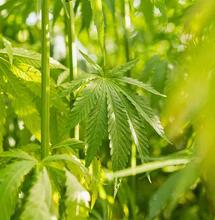Teenage Scottish Boys are most likely to have smoked cannabis says new WHO report.

The new study found that almost a quarter (23%) of boys aged 15 in Scotland polled said they had tried the Class B drug at some point. In one of the biggest studies of its kind, the WHO analysed data from 280,000 children aged 11, 13 and 15 from 44 countries worldwide.
The survey also urged that the UK has a bigger issue with underage vaping than numerous other countries. The survey questioned children living in Europe, Central Asia and Canada about their use of cigarettes, alcohol, vapes and cannabis.
It was found that children in Scotland and Wales were more likely to have smoked cannabis than those in numerous other countries. Both countries are in the global top five.
The Scottish representative involved 4,000 teenagers, 23% of 15-year-old boys reported that they had smoked cannabis in their lifetime, while 16% of girls the same age said the same. Canadian girls ranked highest in the survey with 25% saying they had smoked the drug.
13% of boys and 6% of girls surveyed in Scotland commented that they had used cannabis, in the last 30 days.
International co-ordinator for the study, Dr Jo Inchley from the University of Glasgow said that the high ranking of Scottish boys in the study was "concerning".
"We're not seeing the declines amongst regular users like we do amongst more experimental users. Compared with other countries, we're still relatively high and 15-year-old boys in Scotland have the highest levels of cannabis use across the study as a whole. That's concerning. So, even though we've seen these decreases, we are still relatively high compared to other countries," she said.
The study also examined current trends in smoking, vaping and drinking alcohol among the three age groups.
It was found that two-fifths of girls in England and Scotland have vaped by the time they reach 15. This is a higher rate than in other countries including France, Austria, Germany, Albania, Spain, Canada and Norway.
The study discovered 40% of 15-year-old girls in Scotland, and 33% of boys have used a tobacco vaping product.
"Vaping in the UK is higher than the average across all the countries that took part in the survey as a whole. Steep increases in vaping among young people in the UK threaten to reverse some of the positive trends we’ve seen in substance use in recent years with overall declines in alcohol use and cigarette smoking since the 1990s,"
"Rates of vaping have doubled in the last four years among girls in Scotland. Vapes are far too readily accessible to young people and the health risks are underestimated. New legislation to ban single-use vapes is an important step forward but further action is needed to address these worrying trends,” Dr Inchley.
Has Vaping Overtaken Smoking?
Smoking amongst children is much less common than it used to be with only one in five 15-year-old girls admitting to ever smoking a cigarette -however smoking rates remain higher among girls than boys in England and Wales.
The report affirms that vaping rates have surpassed cigarette smoking in most countries, with almost one in ten 11-year-olds admitting that they've used a vape at least once. This rises to 26% of boys and 40% of girls by age 15.
UK Vaping rates are currently above average in comparison to other countries. Even though vaping is considered much less dangerous than smoking, the risks of children breathing the chemicals into their lungs are not yet fully understood. The UK government has already introduced measures to clamp down on the promotion and criminal sale of vapes to those under 18.
The report suggests countries introduce actions that will protect young generations from harm, these include limiting the availability of nicotine, tobacco products, and alcohol, and a ban on advertising and promotion of any substances on mainstream and social media.
This is an exhaustive study that examined the behaviour of young people in 44 countries ranging from Tajikistan to Greenland, Canada to Belgium. It is an intriguing picture of the sort of dangerous behaviours young people take part in whilst growing up.
Scotland is top of the league table for 15-year-old boys having tried cannabis at some point in their lifetime (23%), but that is only marginally higher than Poland (22%).
England did not submit any data on cannabis use. The study overall shows that overall, cannabis use has either dropped or stabilised in recent years.
Understanding these trends is vital for policymakers as study shows that young people are extremely sensitive to substances such as nicotine, alcohol and cannabis as their brains are still developing.
It is easier for young people to become addicted meaning that there would be knock-on consequences for education, and physical and mental health. By targeting and identifying areas of concern it should be possible to prioritise the measures that need to be put in place and tackle them.
More From Soft Secrets




